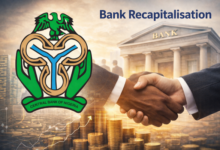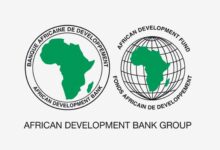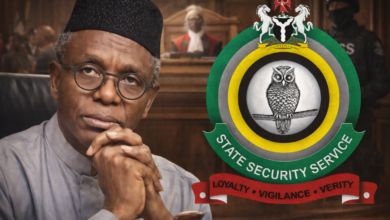Tinubu to Open 2025 Editors’ Annual Conference in Abuja

— NGE sets November 3–6 for national dialogue on governance, media, and cohesion
The Nigerian Guild of Editors (NGE), the nation’s foremost professional body of managing directors, directors of news, and editors across print, broadcast, and online media, has announced that its 2025 All Nigeria Editors Conference (ANEC) will hold from November 3–6, 2025 in Abuja, the Federal Capital Territory.
According to a joint statement issued on Sunday by Eze Anaba, President of the Guild, and Onuoha Ukeh, General Secretary, the annual conference will be declared open by President Bola Ahmed Tinubu.
This year’s conference is themed: “Democratic Governance and National Cohesion: The Role of Editors.” The sub-theme, “Electoral Integrity and Trust Deficit: What Nigerians Expect in 2027,” will sharpen the focus on the challenges ahead of the next general elections.
Focus of the Conference
The NGE stated that the 2025 ANEC will provide a platform to:
- Examine the role of editors in strengthening democratic governance and fostering national unity.
- Debate strategies for promoting inclusivity, dialogue, and shared values amid Nigeria’s socio-economic challenges.
- Identify best practices that can help editors uphold democratic values while bridging ethnic, political, and religious divides.
The Guild emphasized that both the government and opposition leaders have consistently stressed the importance of media support in “promoting the bonds that unite Nigeria’s diverse populations, fostering a sense of unity and collective purpose despite political, ethnic, religious, and cultural differences.”
Broader Context
This year’s ANEC, only the second to be held in Abuja in the last 12 years, comes just four months after the Guild’s Biennial National Convention in Enugu, where new executives were elected.
“The ANEC holds annually for editors to deliberate on issues of national consequence,” the Guild noted. “This year’s edition is designed to explore how the media can promote national development and cohesion through responsible journalism—highlighting unity, diversity, and inclusivity while holding leaders accountable.”
Leaders across government and opposition have repeatedly underscored the media’s integrative role—to help bridge ethnic, religious and regional divides, elevate shared values, and hold power to account without inflaming tensions. With socio-economic headwinds testing national patience, responsible, responsive journalism can lower friction, deepen civic participation and improve policy literacy.
ANEC 2025 arrives four months after the Guild’s Biennial National Convention in Enugu, which produced a refreshed leadership mandate—timely for the industry’s reset on standards, safety, sustainability and skills.
Why This Conference Matters
Nigeria’s democratic project is navigating a complex mix: slow growth and cost-of-living pressures; reform expectations; pervasive misinformation; and a rapidly evolving AI landscape redefining newsgathering, verification and audience trust. Editors are being called to raise standards, rebuild confidence and steward a national conversation that lowers the political temperature while improving accountability.
Against that backdrop, NGE’s agenda squarely targets the profession’s leverage points—standards, systems and stewardship—to help the news industry deliver public-interest journalism that binds a diverse federation.
Inside the 2025 Agenda: What to Watch
- Keynote on the Theme: A values-and-systems blueprint for editors to promote democratic governance and national cohesion without sacrificing scrutiny.
- Election Disputes & Judicial Integrity: Navigating the Thin Line Between Law and Politics—what reforms, transparency protocols and newsroom playbooks are needed ahead of 2027?
- State of the Nation: Imperative of Economic and Political Reforms in a Challenged Nation—how should editors contextualise reforms for citizens and investors?
- The Evolving Face of Journalism: Battling Misinformation, AI Disruption, and the Credibility Gap—editorial QA, provenance labels, synthetic media policies, and AI-assisted newsrooms.
- Media, Terrorism & National Security: Coverage standards that protect lives, prevent amplification of propaganda and sustain civil liberties.
- Wealth Beyond the Newsroom: Personal finance and investment pathways for senior journalists to build resilience after “call of duty.”
BRANDECONOMY Analysis: The Editors’ 2027 Checklist
- Rebuild Trust, Systematically: Publish editorial standards, corrections logs and conflicts-of-interest policies. Adopt transparency labels (sources, methods, AI use).
- Election Integrity Stack: Create a pre-election verification desk, map high-risk narratives, and sign cross-newsroom data-sharing MOUs for results collation and claim-checking.
- AI Governance in Newsrooms: Define acceptable AI use, watermark synthetic media, and train editors on prompting, verification, bias audits and model limitations.
- Safety & Security: Update hostile-environment protocols, legal defence funds, and reporter well-being frameworks for court coverage and conflict beats.
- Cohesion-by-Design: Diversify voices in coverage; prioritise solutions journalism on jobs, MSMEs, healthcare and education that cut across identity lines.
- Monetisation & Independence: Stabilise revenue via reader contributions, events, training products and smart B2B services to reduce capture risks.
- Data + Context: Build internal explainer units with charting and policy literacy to help audiences interpret reforms and court judgments—beyond headlines.












